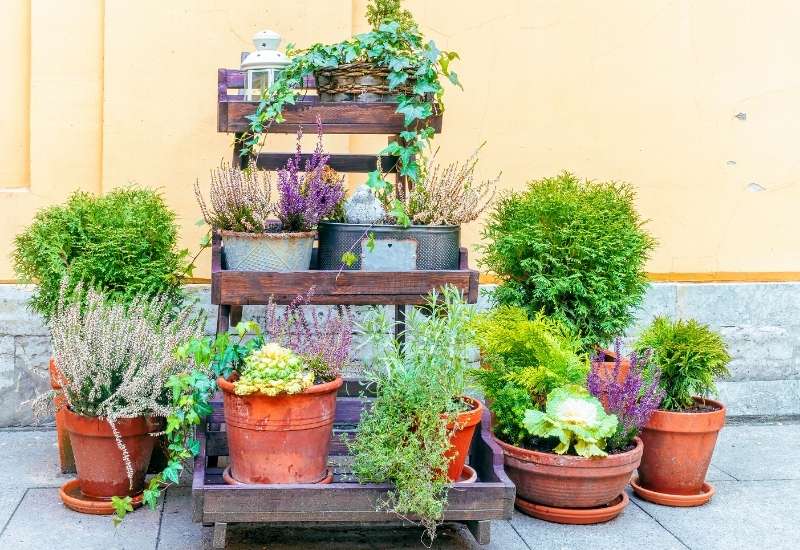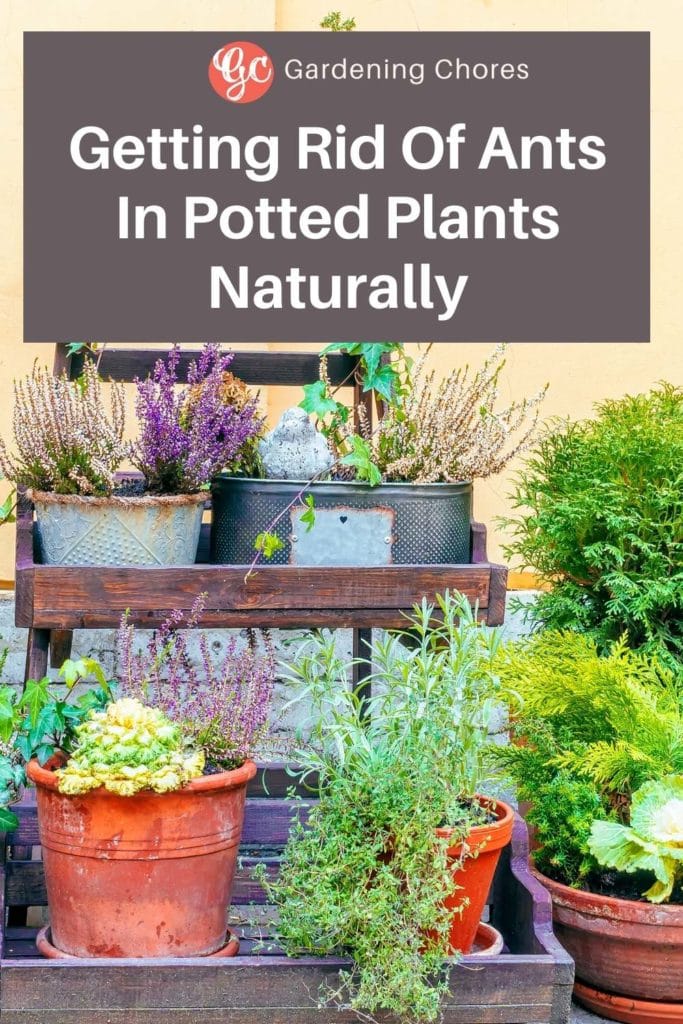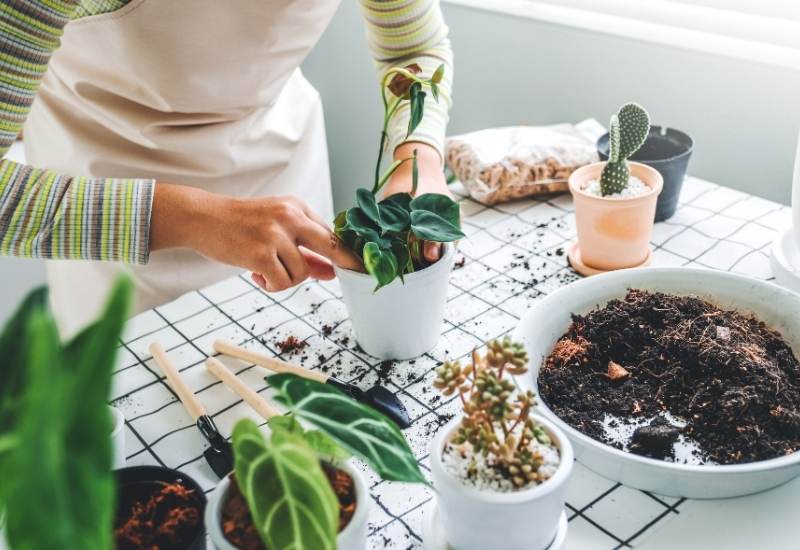
I know the feeling; you look at your beautiful bromeliads and, suddenly, you notice tiny little creatures crawling all over the pot… ants! “Why are they there? How do I get rid of them?” These are, of course, the first thoughts that spring to mind. Don’t worry, there’s a solution to everything.
Ants crawling in your pots and even on your houseplants are not a danger to your plants; they are a nuisance though.
You can solve the problem with natural and even non-violent solutions, without using chemicals and insecticides.
Possibly the easiest and most convenient method to get rid of ants in potted plants is to use essential oils (thyme, yarrow, lavender or citrus), pour a few drops in a spray bottle full of water then spray the plant, soil and pot.
If you wonder why your plants are attracting ants, whether they are dangerous pests, and what you can do to make them leave your pots, just read on…

Why Are Ants In My Plants, Pots And Soil?

If you have ants crawling around your house plants, there can be a few reasons, some are natural, and some are due to you, your home and where you live. Still, understanding why they come to “visit” your plants can explain how you can get rid of them.
Of course, it is easier to get ants in your pots of you live on the ground floor, or if there we ants in your walls.
You can find these six-legged insects in your cupboards if you leave flour or crumbs there, so, don’t be too surprised if they take a detour to your pots as well.
The Link Between Ants, Pests And Disease

Let’s start with a clear point: ants are not pests. On the contrary, ants are so useful to the environment that it is hard to see how the whole world would exist without them.
If you have a garden, an outdoor one, you would want to welcome ants, in fact.
They have a fundamental function on soil maintenance and improvement in fact; they can aerate it by digging into the ground; this allows many small organisms to set in, and that, in turn, makes the soil fertile. In fact, the fertility of soil depends as much on microorganism as it does on nutrients.
Ants are part of the decomposition process, and a key part at that. They break down carcasses of dead animals (even big ones), which is one of the first steps of decomposition, thus natural fertilization.
Ants actually eat pests, like larvae, termites and small insects. They are, in fact, great predators and they keep pest populations at bay.
This is why we cannot say that ants are pests. What is more, do not damage plants directly; they may chew away at decomposing material, but they are not a direct threat to your plants, like some caterpillars, for example.
So, we can call ants a nuisance; they may be annoying indoors, you may not want to see them crawling around, but in the wild, or in an outdoor garden, ants are actually a sign of a good ecosystem.
On the other hand, ants are not just farmers, but also breeders… Yes, they literally breed other insects, like aphids, and they do that for that very sweet excretion which they collect.
When doing this, though, ants also defend aphids from predators.
Aphids are not a deadly threat to plants, but they do suck on the lymph of plants. When they are few, this is no problem at all, but if the aphid colony (or “flock” as ants may call it) becomes big, they can weaken the plant, which then can get attacked by other diseases, like fungi, molds, soot etc.
So, there is a natural balance which we need to understand. Ants are good against some pests but have learnt to breed other insects which, especially on weak plants, can set the conditions for the plants to then get sick by weakening it.
It is all a matter of processes and consequences, as you can see.
Ants Outdoors And Ants Indoors

While outdoors you should always welcome ants – well, maybe you don’t want a colony of killer ants in your garden, but we are talking about “normal” ants…
We were saying, while outdoors they are a fundamental part of the ecosystem, indoors, things are different.
The problem, to be correct, is not actually the ant colony; the problem is that indoor plants do not profit from a whole interconnected ecosystem. I’ll explain.
While in a field ants have a wide choice of plants, and so do aphids, to be precise, the plants in your living room are partly isolated from the natural world out there. This means that their small ecosystem can be thrown off balance very easily.
Of course, indoors ants do not have the same role as outdoors; and having ants around your plants will soon find them heading for your cupboard too.
So, what can you do to get rid of them?
The Two Perspectives On Ant problem Solving
There are almost two different world views when it comes to getting rid of ants: one is quite violent and drastic, and it is to kill them.
The other is a gentler and more “humane” and is is based on the principle that they are very useful living beings and there is no reason to kill them, because you can just send them packing.
No need to say that this is a moral and ethical choice. For many people the first approach is just unacceptable. But there is more than the moral reason why killing ants is, to say the least controversial…
An Inorganic And An Organic Solution
In terms of difficulty (or lack of) the two solutions don’t differ.
Let’s see an inorganic one first.
This is simple, isn’t it? However, it is slightly toxic, and it can cause vomiting and nausea.. Of course, you are unlikely to ingest it in big doses, but children and pets may still be affected.
What is more, most chemical repellants damage the mycorrhiza, small fungi that live in symbiosis with roots and allow them to absorb nutrients. In simple world, you will be hurting your plants.
Getting Rid Of Ants In Container Plants Naturally
No damage done to your plants, no risk for children and animals, and a nice scent around your room.
The Case Against Chemical Pesticides

It may be easy to think, “Well, I’ll sort it out with a pesticide,” but this choice has serious consequences:
6 Natural Ways To Getting Rid Of Ants In Potted Plants

Ants like sweet food and organic matter? Then don’t attract them with it! Keep your cupboard clean; don’t leave crumbs on the floor and food lying around after meals. If you have quite a few ants, it may mean that they are doing the spring cleaning which you have kept on the back burner for far too long…
Gardening, agriculture and most people are moving away from these methods, which are, to say the least, old fashioned. Thankfully, there are natural ways of getting rid of ants.
1: Repotting The Plant To Drive Ants Out

If you notice that the ants are going into the houseplants soil, then it means that there is something inside it that they like. These may actually be small pests, and they may even be chewing away at the roots of your plants.
This way, we can look at ants as indicators that your plant is not too well indeed… Ants should not, unless they have a reason, burrow into the soil of your pots.
If this is the case, then repot your plants and put them in a sterile and clean pot. The chances are that there is a fungal infection.
If you notice pests in the soil as you do this, then change as much as you can of the soil, and you can even sterilize the soil naturally if you suspect that there is some fungal infection within it; all you need is some organic activated charcoal; just sprinkle a thin layer in your pot, and this will solve the problem.
What is more, this is a long term solution, as it also keeps fungi and molds at bay for a long time.
2: Lemon Juice In The Saucer Or On The Pot
Ants don’t live in your pot, do they? Just follow the trail and see where they come from, then block their way. How can you do this? Well, let me tell you a secret: if ants love sweet, they hate strong acidic substances.
These literally confuse them; ants detect chemical substances, they are very sensitive to them. A very simple, cheap, and totally effective substance to keep ants away is lemon juice. You will never find an ant anywhere near them. Alternatively, you can even use vinegar.
So, drop some lemon juice on the way path they follow to get indoors, and they will just keep away.
Do it in the morning before they wake up, so you don’t block any ant inside. Otherwise, the ones trapped indoors will keep going back and forth trying to find a way out.

You can use lemon juice to protect your pots form ants.
The smell will keep ants at a distance.
Alternatively, you can put a few drops in the saucer; now, this is fine as long as the plant is an acidophilic plant (like azaleas, caladiums and Japanese iris, also, most succulents like slightly acidic conditions).
If your plant likes a fairly alkaline soil (hyacinth and crocus for example) then spray it only on the outside of your pot.
If you don’t have lemon, any string citrus smell will put them off (bergamot for example), but not orange (they love it).
If you want to have a longer lasting effect, use citrus essential oils. Just a few drops will last for days.
3: Use Cinnamon Sticks (Or Powder) Cinnamon To Get Rid Of Ants In Plants

There are many smells ants love, and many they can’t stand. Fortunately, those that they despise are very pleasant to us! So, you can “save two birds with one stone” (I don’t like “kill”) and refresh your room with a nice fragrance while getting ants out of the way.
And guess what? Ants detest cinnamon; what is for us reinvigorating smell is for them a”terrible pong”. How can you do this?
Ants will keep as far from it as possible. This way, you will also enjoy some aromatherapy for yourself and your household.
You can use cinnamon powder instead, but the aroma does not last as long as sticks.
4: Water In The Saucer

This is a very simple solution; ants don’t like to swim, and if you put water in the saucer, you will create a “moat” a bit like they used to with medieval castles…
This solution is very simple and straightforward, however, you need to be careful because it is not without risks.
To start with, not all plants like to have water in the saucer; doing this with succulents, for example, means risking root rot. With other plants, still, especially if they like dry soil, you may have two solutions:
Note that succulents do not even like the humidity coming from the saucers, even if they are not directly in touch with the water. These solutions are fine with other dry loving plants, like thyme, orchids and sago palms.
5: Drive Ants Away With Mint Essential Oil

You guessed it; ants do not like the string smell of mint either. Using mint essential oil will keep them at a distance; put a few drops in the saucer (or on the pot), and you will refresh your room while also sending ants away (and mice)!
6: Plant Marigold For Ants

There are plants that some insects can’t stand. Geraniums are famous for keeping insects away, and this might well be one of the reasons why we find them in window boxes of Alpine cottages. But if you want a plant that ants really cannot stand, then plant beautiful marigolds!
To be honest, marigolds are unbearable to many insects, ants included. You can plant them around your house (and that’s why they are common in borders around buildings) or just keep a pot of marigolds among your other plants.
What better way to fend off ants from your pots with beautiful flowers?
A Natural End To The problem
Let’s remember that ants are only a nuisance, and that they are much more useful to the world than we Humans are or possibly ever will be.
Using chemicals to kill them is, to use a sad metaphor “overkilling it”. It is unnecessary and dangerous, for the environment, and for your health and that of your family or household, including your pets.
There are natural ways which are safer, cheaper, more humane and as effective. What is more, they are actually fun, and have many perks too.
You can just use water, or maybe add some nice fragrance to your room while keeping ants away, and you can choose from citrus, mint, lavender, yarrow or even cinnamon…
The easiest and most convenient way is to use essential oils diluted in water and a spray bottle. Alternatively, you can even grow flowers to get ants packing…
Let’s be honest, the natural way is not just the better way, it is also the more (the only) creative solution to a very small problem indeed.

Written By
Adriano Bulla
After many years as an academic in London, Adriano Bulla became a writer, publishing books like A History of Gardening, Organic Gardening and Elements of Garden Design; he then decided to become a gardener, following his childhood dream, and has been following his dream writing and gardening professionally in Southern Europe, where he has specialized in new and innovative organic gardening fields and techniques, like permaculture, regenerative agriculture, food forests and hydroponics.

Most grateful for this article, thank you.
Thank you so much! I will plant marigolds among my Geraniums in my pots this year
Im going to try the cinnamon sticks.
Ways to get rid of ants in the garden soil: frequently water your garden soil, use ant repellent scents, pour boiling water into ant’s nest, use an ant bait using borax and sugar, apply nematodes, plant herbs that repel ants, apply diatomaceous earth (de) to the soil.
The most ants I saw were in pots of mint! Thus, I don’t think they hate the odor…